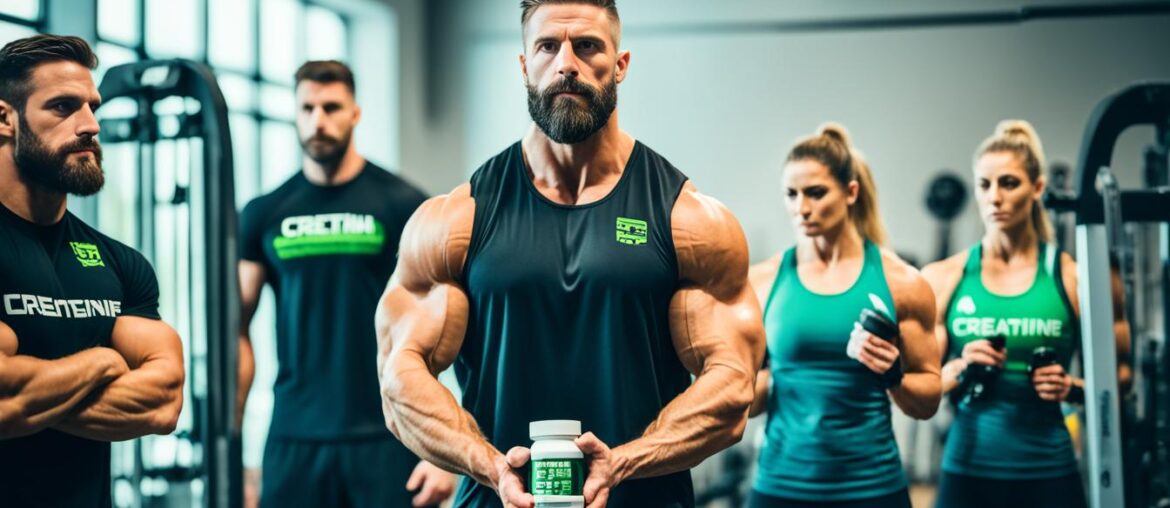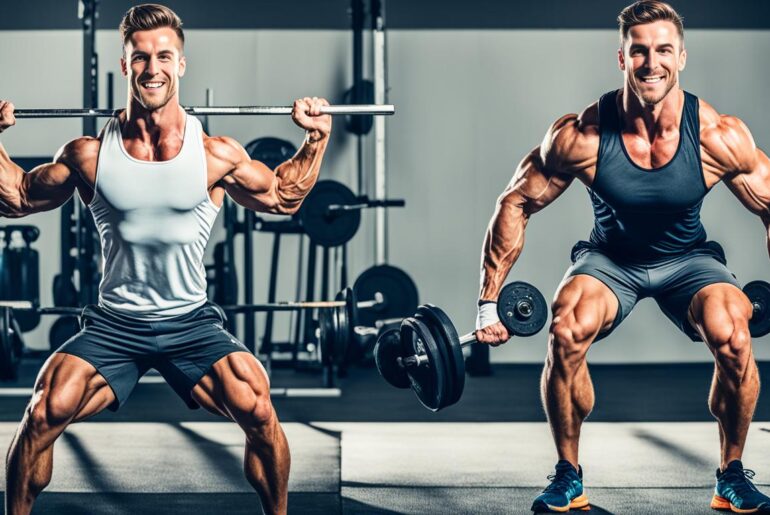With 6% of U.S. consumers now claiming to follow a vegan lifestyle, a surprising ripple effect has emerged within the realm of sports—vegan athletes are steadily on the rise. This shift poses an intriguing question about the benefits of creatine for vegan athletes, particularly when considering vegan nutrition and athletic performance. For vegan athletes, the challenge of maximizing muscle energization is magnified. This is where creatine, typically found in meat, swoops in as an indispensable ally, especially since a plant-based diet alone may not provide the necessary amounts for peak athletic performance.
I often delve into how a plant-based diet and athletic performance can coexist harmoniously. Given that creatine is a naturally occurring amino acid that plays a crucial role in providing energy for muscle contractions during high-intensity, short-duration exercises, it’s an area of special interest for athletes who avoid animal products. For vegans, supplemental creatine offers a promising solution, potentially leveling the playing field and allowing for muscle growth and improved performance akin to their non-vegan peers.
Key Takeaways
- Creatine is a critical supplement that can elevate the performance of vegan athletes.
- A plant-based diet may not supply sufficient creatine, necessitating supplementation for competitive sports success.
- The correct use of creatine can lead to significant gains in muscle mass and strength for vegans.
- Integrating creatine offers a synergy with vegan nutrition, sparking an increase in energy and performance.
- For vegan athletes, creatine supplementation stands as a well-supported method for optimizing athletic output.
- Evidence suggests that vegan athletes can benefit greatly from the muscle creatine stores increased through supplementation.
The Importance of Creatine in Athletic Performance
As an advocate for optimal fitness regimes, I have witnessed firsthand the transformational role that creatine supplementation plays in the realm of sports and high-intensity activities. Its fundamental contributions to ATP synthesis and energy provision are particularly pronounced when we delve into the needs of vegan athletes.
Definition and Role of Creatine in Energy Production
Creatine is a naturally occurring compound that serves as a critical player in the body’s energy system. Especially during short bursts of activity, like lifting weights or sprinting, the availability of ATP (adenosine triphosphate) is essential. My body, like yours, synthesizes creatine using amino acids and then stores it as phosphocreatine within muscles, ready to be utilized for quick ATP production. For those adhering to plant-based regimes, ensuring adequate creatine levels becomes necessary for peak high-intensity performance.
Benefits of Creatine in High-Intensity Training
There’s an old adage in the athletic world – ‘To perform like a beast, you must train like one.’ Training sessions often push you to the limit, and this is where creatine thrives; it’s shown to bolster phosphocreatine stores in muscles, thus facilitating swift regeneration of ATP. This bioavailable energy directly supports my muscular endurance and power, making creatine supplementation a game-changer for consistency and effectiveness in high-intensity workouts.
| Impact of Creatine Supplementation | Benefits Witnessed by Vegan Athletes |
|---|---|
| Enhanced ATP Replenishment | Increased strength and power output |
| Amplified Training Volume | Improved high-intensity exercise performance |
| Accelerated Muscle Recovery | Reduced fatigue, enabling quicker recovery periods |
In my journey promoting a healthier supplement approach, advocating creatine for vegan athletes has become a hallmark. The absence of natural creatine from animal sources in their diet pinpoints the heightened importance of supplemental creatine to support their high-octane lifestyles and maintain a competitive edge in their sports endeavors.
Challenges of Creatine Intake for Vegan Athletes
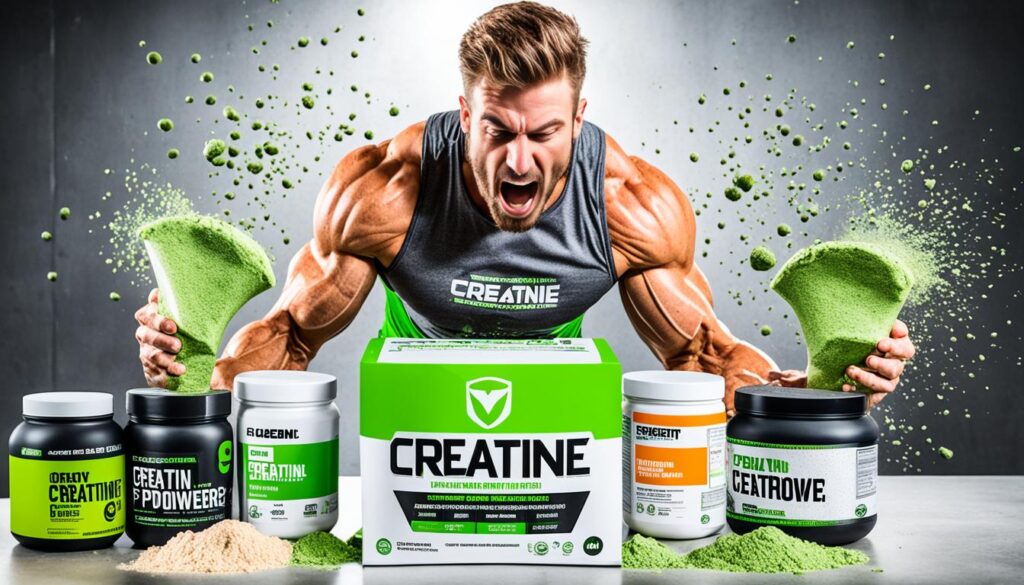
Embracing a vegan diet and muscle building ambition often results in plant-based athletes facing significant nutritive hurdles. One such challenge is maintaining sufficient levels of creatine, a pivotal compound associated with energy production in high-intensity sports. Unlike their omnivorous counterparts, vegan athletes lack the creatine-rich advantage offered by meat and fish, leading to lower baseline muscle creatine concentrations.
This inherent deficiency presents creatine intake challenges for vegans, who must often turn to supplementation to achieve the phosphocreatine replenishment that is so critical for peak performance during explosive movements and endurance activities. However, the decision to incorporate supplemental creatine comes with considerations unique to vegan dietary frameworks.
- Assessment of existing dietary intake to ensure supplementation is necessary and beneficial
- Determining the optimal dosing that aligns with individual energy demands and workout regimens
- Evaluation of various creatine types to find those that are vegan-friendly and devoid of animal derivatives
For any plant-based athlete invested in muscle building, the awareness of creatine’s pivotal role in energy synthesis is the precursor to overcoming such challenges. It is essential for vegan athletes to stay informed on the most effective practices for creatine supplementation, ensuring full engagement in their high-powered sporting endeavors.
Creatine Stores and Plant-Based Diets: The Science Explained
As we delve into the nuances of vegan athletes and creatine supplementation, a stark difference emerges when we compare the creatine stores between individuals on a plant-based diet and their omnivore counterparts. Such differential levels of creatine are instrumental in understanding the impact of diet on athletic performance. In my exploration of this topic, the significance of amino acid synthesis in supporting physical endeavors for those on plant-based diets becomes undeniably clear.
Differential Creatine Levels in Vegans Versus Omnivores
The unique dietary patterns of vegans undoubtedly affect creatine levels within the body. It’s known that meat consumes play a pivotal role in naturally elevating creatine concentrations, providing an edge in terms of energy availability. Conversely, vegan athletes encounter a challenge in accessing this direct source of creatine, as their plant-based diet yields minimal amounts.
Let me share a comparison that elucidates this point:
| Diet Type | Average Creatine Intake (per day) | Typical Creatine Concentration in Muscle |
|---|---|---|
| Omnivore | 2g | Higher due to dietary intake |
| Vegan/Vegetarian | Negligible | Lower due to lack of dietary intake |
These differences lay the groundwork for a compelling argument favoring creatine supplementation among vegan athletic circles to bridge the gap and maintain competitive performance.
Synthesis of Creatine from Amino Acids in Vegans
The human body is a marvel of science, capable of synthesizing creatine from specific amino acids, namely glycine, arginine, and methionine. For vegans, however, the internal production of creatine does not always meet the elevated demands imposed by rigorous physical training. This reality underscores the need for external sources of creatine to achieve optimal athletic output.
Reflecting on these facts, I’m convinced that the addition of creatine supplementation can significantly enhance a vegan athlete’s regimen, substantiating the investment in health and athletic longevity.

When it comes to vegan nutrition and athletic performance, there’s a hive of activity buzzing around the role of plant-based supplements for athletes. In this discussion, creatine emerges as a particularly hot topic. Unlike their omnivorous counterparts, athletes who abstain from animal products often encounter skepticism—can their choice of diet meet the rigorous demands of their sport? My exploration into this domain is not just about dispelling myths but shining a light on the factual evidence of creatine supplementation benefits.
Debunking Misconceptions About Plant-Based Athletes & Creatine
One myth that I’ve come across frequently is the notion that plant-based diets inherently provide all necessary nutrients for athletic prowess, including sufficient creatine. However, science tells us that this is not the case—vegan athletes tend indeed to have lower creatine levels since their diet excludes meat, where creatine is predominantly found. This is where supplements soar in significance. Creatine supplementation steps in to fill this gap, proving itself as a non-negotiable ally for those seeking peak physical performance on a vegan diet.
Assessing the Evidence: Creatine Supplementation Studies
Let’s dive into the cold, hard facts and assess the evidence behind creatine supplementation. The proof isn’t anecdotal; it’s backed by study after study that consistently points to creatine’s muscle mass and strength enhancement effects. Interestingly, these studies often find a more pronounced response in vegan athletes, attributing this to their initially lower muscle creatine stores. As I see it, this positions creatine supplementation as a critical player in the vegan athlete’s toolkit—a tool that’s science-approved, I should add.
As someone immersed in this discussion, I present to you a compelling comparison of creatine levels in both vegan athletes and non-vegan athletes to further validate these facts:
| Group | Baseline Muscle Creatine Levels | Post-Supplementation Muscle Creatine Levels | Performance Improvement |
|---|---|---|---|
| Vegan Athletes | Lower | Significantly Increased | More substantial |
| Non-Vegan Athletes | Higher | Mildly Increased | Less substantial |
In my ongoing quest to present accurate information, this comparison succinctly illustrates why vegan athletes can greatly benefit from and should consider incorporating plant-based creatine supplements into their nutritional regimen.
Optimizing Vegan Athletic Performance with Creatine
As I delve into the world of vegan athleticism, one element rings true: creatinine benefits are a game-changer. It’s not just about choosing a variety of vegan protein sources for athletes but understanding how to fully leverage the perks of creatine to boost one’s fitness agenda. For those dedicated to optimizing vegan athletic performance, creatine presents as a crucial supplement.
Through my research and experiences, I’ve seen firsthand how creatine works wonders in heightening muscular endurance and strength. Significantly, it seems that a regime of creatine can lead to improved workout outcomes, especially for those on a plant-based regimen. It’s not simply about random supplementation, however; success arises from a well-structured creatine protocol. Initially, it involves a ‘loading phase’ to saturate the muscles with this valuable resource, swiftly followed by a ‘maintenance phase’ that upholds the new, elevated creatine levels.
- Initial loading phase – surges creatine levels in muscles
- Daily maintenance – sustains the elevated creatine stores
- Balanced vegan diet – ensures overall nutritional synergy
It is crucial to appreciate that while creatine is powerful, it must be married with a strategic nutrition plan that is rich in vegan protein and other essential nutrients to truly harness the creatinine benefits.
| Creatine Supplementation Phase | Duration | Daily Dose | Expected Benefit |
|---|---|---|---|
| Loading | 5-7 days | 20-25g | Rapid increase in muscle creatine content |
| Maintenance | Long-term | 3-5g | Sustained creatine levels for ongoing improvements |
Unquestionably, incorporating creatine into a plant-based athlete’s diet catalyzes a dramatic shift in their performance capabilities, signifying a leap towards their peak athletic potential.
My conclusion is that by adroitly incorporating creatine into their daily routine, vegan athletes can experience a notable upturn in their training outcomes, be it in muscle mass, strength, or overall performance. This practice isn’t just about improving in the short-term but setting the foundation for long-term athletic achievements, all while sticking to the vegan ethos.
Plant-Based Diet and Athletic Performance: Beyond Creatine
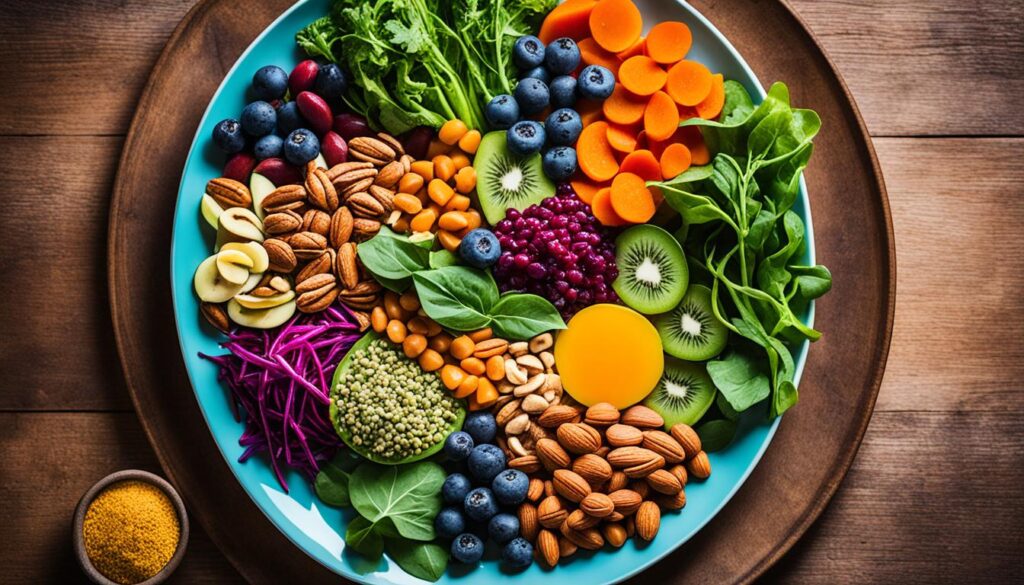
Achieving peak athletic performance on a vegan diet involves much more than just adding creatine to the mix. It’s about ensuring that I get a breadth of nutrients essential for energy, recovery, and endurance. As someone committed to a vegan lifestyle and athletic excellence, I focus on several additional nutrients that are critical to my dietary regimen.
Additional Nutrients of Concern for Vegan Athletes
In my journey, I’ve identified several nutrients that are particularly important for vegan athletes, including omega-3 fatty acids, vitamin B12, iron, and calcium. Omega-3 fatty acids are crucial for reducing inflammation and aiding recovery, while B12 is vital for energy production. Iron helps in delivering oxygen to my muscles, and calcium is imperative for bone health and muscle function. Ensuring sufficient intake of these nutrients is a mainstay of my comprehensive vegan nutrition plan.
Comprehensive Approach to Vegan Nutrition and Athletic Output
To optimize my performance, I pursue a well-rounded diet that not only supports my physical demands but also aligns with my ethical choices. Incorporating a variety of vegan protein sources such as lentils, chickpeas, tofu, and quinoa is key to my muscle repair and growth. I also emphasize micronutrient-rich foods like leafy greens, nuts, seeds, and fortified plant milks to maintain robust health and facilitate recovery.
By adopting a diet that addresses the increased metabolic strain from training, I can complement creatine supplementation effectively, ensuring that all my nutritional bases are covered. Here’s an overview of the additional nutrients I focus on and the food sources that provide them:
| Nutrient | Role in Athletic Performance | Vegan Food Sources |
|---|---|---|
| Omega-3 Fatty Acids | Reduce inflammation, improve heart health | Flaxseeds, chia seeds, walnuts, algae-based supplements |
| Vitamin B12 | Essential for energy production, nerve function | Nutritional yeast, fortified plant milks, B12 supplements |
| Iron | Crucial for oxygen transport to muscles | Lentils, spinach, tofu, fortified cereals |
| Calcium | Important for bone health and muscle function | Kale, fortified plant milks, tahini, figs |
As I channel my focus on these nutrients, I’m not just aiming for the immediate benefits to my athletic performance, but also striving for long-term health and well-being. A varied and thoughtful vegan diet, paired with targeted supplementation where necessary, elevates my athletic performance beyond what creatine alone can offer.
Creatine Supplementation Protocols for Vegan Athletes
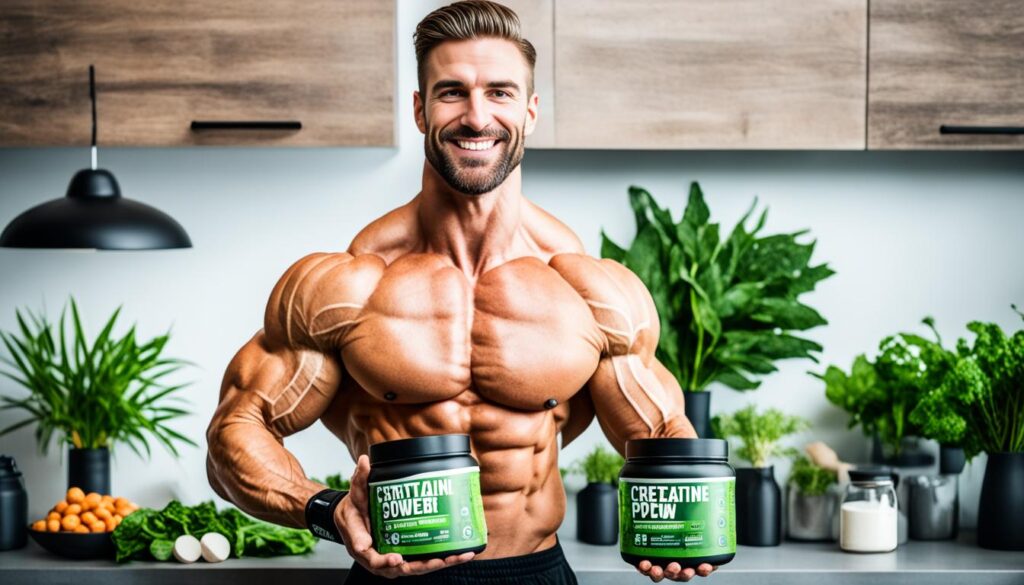
Uncovering the full benefits of creatine for vegan athletes hinges on adhering to well-crafted creatine supplementation protocols. These protocols are designed to maximize the uptake and storage of creatine in the muscles, which can substantially elevate an athlete’s performance capabilities and muscle development.
I find that my training routine greatly benefits from integrating creatine into my post-workout regimen. The right protocol not only enhances my recovery but also prepares my muscles for subsequent training sessions. Let’s examine the typical creatine intake strategies:
| Loading Phase | Maintenance Phase | Non-loading Protocol |
|---|---|---|
| 20-30 grams per day | 3-5 grams per day | 3-5 grams per day |
| Approx. 1 week duration | Continual daily dosage | 3-4 weeks to full saturation |
| Quickly saturates muscles | Keeps creatine levels steady | Slower increase, steady uptake |
The common approach, often advocated within vegan athletes and creatine supplementation protocols, entails a loading phase that rapidly increases creatine levels in the muscle. For me, committing to a week of higher creatine intake kick-starts the process effectively. Following the loading phase, transitioning to a lower, daily maintenance dose ensures that my muscles remain saturated with this essential nutrient, ready for high-performance demands.
On the other hand, athletes who prefer to avoid the loading phase can still benefit from a steady, daily intake. This slower method appeals to my peers who are cautious about initial high doses or who may experience digestive discomfort.
For optimal absorption, I combine creatine with a post-workout meal that’s rich in proteins and carbohydrates. This strategy seems to facilitate creatine uptake, making sure that the muscles are replenished and energized for my next athletic endeavor. Striking the right balance offers a range of benefits critical to my performance and aligns with a vegan dietary approach.
Vegan Protein Sources and Muscle Building
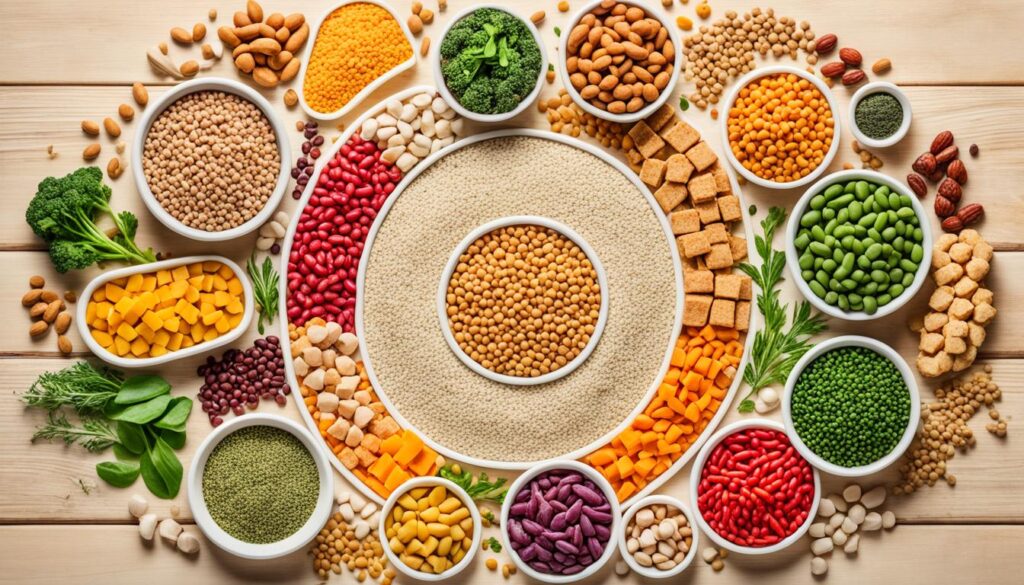
As we delve into the efficacy of vegan protein sources for muscle building, it’s crucial to spotlight the ongoing debate comparing plant-based and animal-based protein efficacy. Many athletes are turning to vegan diets for ethical and health reasons but may wonder how this shift affects their muscle growth and athletic performance.
Comparing Plant-Based and Animal-Based Protein Efficacy
Animal-based proteins are known for being complete proteins, which means they contain all essential amino acids necessary for muscle synthesis. As for plant-based proteins, some may lack in one or more essential amino acids but this is easily circumvented by eating a variety of protein-rich plant foods throughout the day. With strategic meal planning, vegan protein sources for athletes can be just as effective for muscle building as their animal-based counterparts. Let’s take a closer look at how certain plant proteins stack up against animal proteins in the table below.
| Protein Source | Essential Amino Acids | Protein per Serving | Additional Benefits |
|---|---|---|---|
| Quinoa (Plant-Based) | Complete | 8g per cup (cooked) | Rich in fiber and micronutrients |
| Tofu (Plant-Based) | Complete | 20g per 1 cup (firm tofu) | Contains isoflavones linked to improved heart health |
| Chicken Breast (Animal-Based) | Complete | 53g per breast | Low in saturated fat |
| Black Beans (Plant-Based) | Incomplete | 15g per cup (cooked) | Rich in antioxidants and fiber |
| Whey Protein (Animal-Based) | Complete | 20-25g per scoop | Fast absorption rate for muscle recovery |
Integrating Plant-Based Proteins With Creatine for Muscle Growth
One aspect of muscle building where plant-based athletes may need extra attention is in supplementing with creatine. Unlike animal-based protein sources, plant-based proteins generally come without the naturally occurring creatine found in meat. By adding creatine supplementation to their regimen, vegan athletes can enjoy the same benefits for muscle building, power output, and recovery, often seeing even more significant gains due to their initially lower creatine stores.
Leveraging plant-based proteins effectively for muscle growth is achievable and can even have unique advantages over a diet that relies on animal protein. Integrating varied vegan protein sources with creatine is a powerful strategy for athletes looking to build muscle while adhering to a plant-centred lifestyle.
Plant-Based Supplements for Athletes: Beyond Creatine
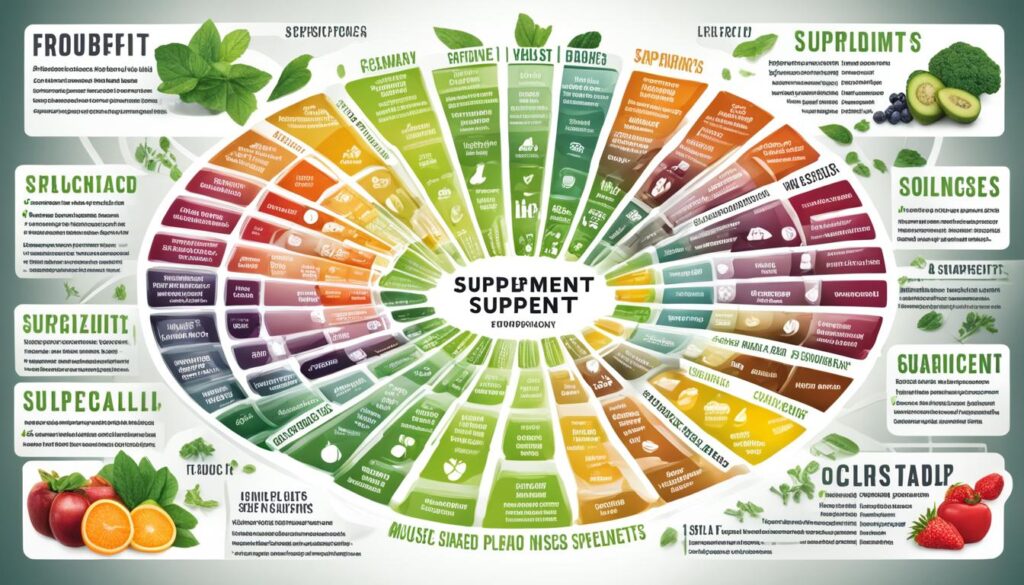
As a vigilant fitness enthusiast committed to veganism, I recognize that optimal athletic performance is fueled by more than just macronutrients. Plant-based supplements for athletes play a critical role in ensuring a comprehensive nutritional profile that supports endurance, recovery, and muscle building. It’s not just about hitting the gym and counting calories—adequate absorption of vitamins and minerals is pivotal for peak physical condition, especially when adhering to a plant-based diet for muscle building.
Among the myriad of supplements available, several stand out for their specific benefits to vegan athletes:
- Protein powders derived from peas, rice, or hemp offer a convenient and effective way to increase protein intake, essential for muscle repair and growth.
- Omega-3 fatty acids, particularly those sourced from algae, are a vegan-friendly option to combat inflammation and boost cognitive and cardiovascular health.
- Key micronutrients like vitamin D2/D3, iron, and zinc are integral in supporting immune function, oxygen transport, and overall cellular metabolism.
Understanding the synergy between various plant-based supplements and vegan nutrition can profoundly impact athletic performance. It’s not just about supplementation in isolation but about creating a tailored strategy that complements and enhances a well-planned vegan diet.
| Supplement | Primary Function | Recommended Form | Suggested Use |
|---|---|---|---|
| Protein Powder (Pea/Rice/Hemp) | Muscle Growth and Repair | Powder | Post-Workout/Meal Replacement |
| Algal Omega-3 Fatty Acids | Anti-inflammatory/Cardiovascular Health | Capsule/Liquid | With Meals |
| Vitamin D2/D3 | Bone Health/Immune Function | Tablet/Liquid | Morning, With Fat-Containing Meal |
| Iron | Oxygen Transport/Energy Metabolism | Tablet/Capsule | With Vitamin C-Containing Food or Drink |
| Zinc | Immune Function/Wound Healing | Tablet/Lozenge | With Meals |
In integrating these supplements, I’ve personally experienced enhanced recovery times, noticeable improvements in strength, and an overall sense of well-being that extends beyond the gym. It’s not merely about achieving aesthetic goals or personal bests; it’s about nurturing a body that is as resilient as it is robust, capable of sustaining a rigorous training regimen while adhering to a compassionate, plant-based lifestyle.
In conclusion, the judicious use of plant-based supplements is an indispensable component for any athlete, particularly those on a vegan diet. It bridges the nutritional gaps and fosters an environment conducive to physical excellence. As with any dietary changes or supplement regimen, it’s paramount to consult with healthcare professionals, ensuring that each addition is not just safe but beneficial for your unique athletic journey.
Conclusion
Throughout my exploration of vegan athletes and creatine supplementation, it’s become clear that creatine is not just an auxiliary nutrient but a cornerstone in a vegan athlete’s diet. The crucial benefits of creatine for vegan athletes span the spectrum of improving strength to enhancing endurance. As someone immersed in the world of plant-based athleticism, my research affirms that creatine’s role is indispensable in addressing the natural shortfall in a vegan diet, particularly for those committed to rigorous physical pursuits.
Recap of Creatine’s Role in Vegan Athleticism
My findings assert that the enhancement of muscle creatine stores through supplementation is instrumental in amplifying workout performance. For individuals dedicated to vegan diet planning, incorporating creatine supplementation is a well-substantiated method to foster athletic progression. It bridges the gap inherent in plant-based nutrition, catapulting energy availability, and underpinning the strenuous demands of high-intensity sports activities.
Final Thoughts on Supplementation and Diet Planning
Aiming to strike the right balance, I have found that the integration of creatine with a meticulously planned vegan diet optimizes athletic capabilities while adhering to vegan principles. It’s not solely about substituting animal products but about creating a nutritional symphony where each supplement, including creatine, plays its pivotal part. As I navigate my athletic journey, I remain convinced that with strategic dietary inclusivity, vegan athletes can indeed flourish and possibly outperform their omnivorous counterparts.
FAQ
What are the benefits of creatine for vegan athletes?
Vegan athletes can benefit from creatine supplementation as it helps to increase muscle creatine stores, enhance strength, aid in muscle mass development, and improve overall performance in high-intensity training. Due to lower baseline levels of creatine from a plant-based diet, vegans may experience more pronounced benefits from supplementation.
Why is creatine important for athletic performance?
Creatine is vital for athletic performance because it plays a crucial role in the rapid production of ATP, the energy needed for high-intensity activities like sprinting and weightlifting. Supplementation can lead to increased phosphocreatine stores in the muscles, facilitating improved performance and energy management during intense workouts.
How do vegan athletes face challenges with creatine intake?
Vegan athletes face challenges with creatine intake because creatine is naturally found in animal products and not in plants. This means vegans potentially have lower baseline levels of muscle creatine, which can impact their performance in sports requiring quick, powerful movements.
Can vegan athletes synthesize enough creatine from amino acids?
While vegan athletes can synthesize creatine from amino acids such as glycine, arginine, and methionine, the amount produced might not meet the high demands of intensive training. This makes creatine supplementation a valuable addition to a vegan athlete’s regimen.
Are there misconceptions about plant-based athletes and creatine?
Yes, there are misconceptions that a plant-based diet can provide sufficient creatine for athletic performance, despite evidence showing that vegan athletes have lower creatine stores and can greatly benefit from supplementation.
How should vegan athletes approach creatine supplementation?
Vegan athletes should consider a strategic supplementation protocol, including an initial loading phase of 20-30 grams per day for about a week, followed by a maintenance dose of 3-5 grams daily. This approach can maximize the enhancement of their strength, performance, and muscle mass.
What other nutrients should vegan athletes focus on?
Beyond creatine, vegan athletes should pay attention to other nutrients that may be deficient in plant-based diets, such as omega-3 fatty acids, vitamin B12, iron, and calcium. Ensuring a balanced intake of these nutrients can support overall health and athletic performance.
How do vegan protein sources compare to animal-based proteins for muscle building?
While individual vegan protein sources may lack certain essential amino acids, combining a variety of plant-based proteins can provide a complete amino acid profile necessary for muscle building. When paired with creatine supplementation, this can be an effective strategy for muscle growth in vegan athletes.
Are there plant-based supplements for athletes beyond creatine?
Yes, several plant-based supplements can support vegan athletes, including protein powders from peas, rice, or hemp, algae-derived omega-3 fatty acids, and micronutrients such as vitamin D2/D3, iron, and zinc. Adapting supplementation to individual needs is key for achieving optimal performance.
What impact does creatine have on the overall diet and supplementation strategy of vegan athletes?
Creatine enhances the diet and supplementation strategy of vegan athletes by increasing their capacity for high-intensity exercise and muscle mass gains. It’s an integral part of a well-rounded approach that includes a focus on diverse nutrient intake, helping vegan athletes maintain peak performance.

